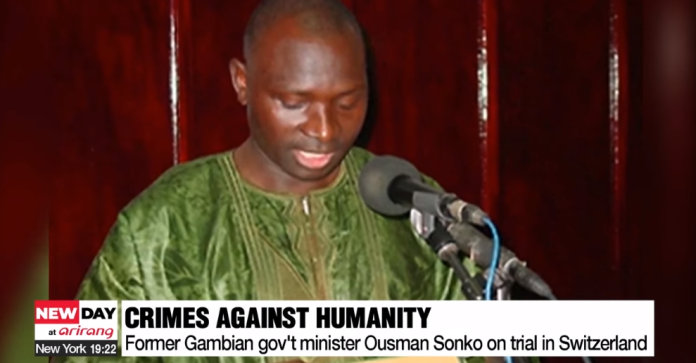
(acts of torture, false imprisonment and sexual violence committed as crimes against humanity)
As part of an attempted coup d’état in March 2006, Ousman Sonko is being accused, as an accomplice of a group of perpetrators, of having tortured various people, including members of the army, politicians and journalists, of having illegally deprived them of their freedom, as well as of having committed a rape in Banjul (The Gambia).
The first plaintiff to be called to the stand is a Gambian citizen who started his career within the Gambian police force before being integrated in the national army. In March 2006, his military superior – Ndure Cham – was accused by the Gambian government to have fomented a coup d’état. The plaintiff was arrested within the frame of the investigation related to this event.
Ousman Sonko contested all the charges brought against him in relation to this plaintiff.
The latter was called to provide his statement and recalled having been arrested on 21 March 2006. During his first night of incarceration, he was brought from the Mile 2 prison to the premises of the National Intelligence Agency (NIA). There, members of the Army,ofthe so-called Junglers, and of the NIA as well as, notably, Ousman Sonko, along with the former Deputy chief of Defense Staff and the head of the police major crime unit were setting up an investigation panel.
The plaintiff further explained that the night of his arrest, he was violently interrogated on his suspected participation in the coup. He was afterwards taken several other times to the NIA and submitted to acts of torture. He was also threatened with death, including with weapons. On several occasions, he was forced to sign statements against his will. He still suffers from serious physical and mental after-effects of the acts of torture he has been submitted to.
He recalled that the panel members – including Ousman Sonko – knew very well that people were being tortured within the frame of this investigation. The accused actually saw the plaintiff’s own wounds.
The plaintiff was only taken before a judge months after his arrest and was convicted – along with other persons – to very long prison sentences. He spent nine years in prison in difficult conditions.
As for the Gambian context at the time, he explained that the country was under extreme dictatorship. People were arrested and imprisoned without being brought before court. Others disappeared. People were living in constant fear.
Coming next: Hearings continue on the March 2006 alleged coup plotters’ torture events.


